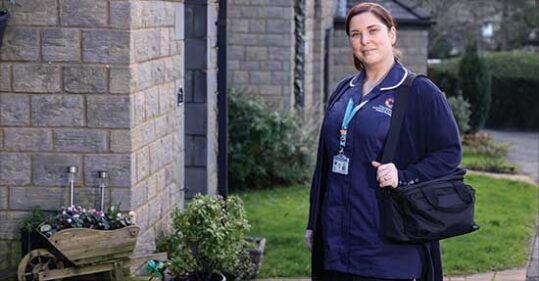My day: Working as a complex care nurse

Jennifer Crozier shares the highlights of a day in her role supporting people over 65 living at home with varying degrees of frailty.
08.30
Today I am the team coordinator, so I start by checking the complex care email inbox. It is empty, but I will check it throughout the day. When a referral is received, I check it is appropriate (that is, for a person aged over 65 living with a degree of frailty) before phoning the person to introduce our service and complete an initial frailty assessment using a PRISMA-7 questionnaire. This is a brief, seven-item yes/no form used to identify elderly people with a severe loss of autonomy. A person scoring four or lower is allocated to a care coordinator to make contact; a score of five or higher will lead to a nurse arranging a full home visit assessment.
09.30
Time for our team huddle. We all gather to discuss any concerns, and support each other with problem solving and complex cases. We discuss plans for the day and advise on any team updates. Today I have two first-assessment visits and a best-interests meeting to attend.
Related Article: MPs vote to legalise assisted dying in England and Wales
10.30
I arrive for my first patient visit. The lady has been referred to us by her GP, who advised that although she is a high service user, this relates to social needs and loneliness more than medical issues.
I complete a full assessment. The patient lives alone and is housebound. She tells me that she used to own a dog and felt safe but has been has very lonely since he passed away. I comfort her and we start to build a rapport. Her physical observations examination is normal but she feels weak on her legs and we discuss the available interventions. She agrees to physiotherapy to help with leg-strengthening exercises; the falls team will support with falls-prevention measures. Pharmacy will also conduct a structured medication review, as her multiple medications could contribute to the risk of falling. The patient is also interested in a befriending service, and animal therapy support through social prescribing. I arrange a review visit in a month’s time.
12.30
I am back at the office typing up my home visit notes and completing the agreed referrals. We add all comments to the practice IT system and to our own frailty tracker, which is used for data collection, measurement of referrals and key performance indicators.
13.00
Lunchtime offers an opportunity to interact informally with colleagues. We share stories, laugh and switch off from the working day. As a team, we stress the importance of stepping away from our computers at lunch time to allow ourselves to recharge, focus and bond with each other. Today was particularly good, as a colleague brought cakes to share with the team – lemon drizzle, delicious.
14.00
I arrive at a patient’s home to be part of a multidisciplinary team for a best-interests meeting, alongside a social worker, a family member (next of kin) and the patient’s physiotherapist. The patient had been assessed as not having the capacity to make decisions. We discuss the patient’s needs, and agree on how to support her care safely, guided by her best interests.
Related Article: Super-regulator finds ‘weaknesses’ across NMC’s regulatory functions
15.00
I am on the way to my next home visit. The patient has been referred by the primary care network paramedic, who said the gentleman is deteriorating medically but does not want to go into hospital and so may benefit from some advanced care planning. I complete a full ACP with him. He says he feels like a weight has been lifted off his shoulders as all his future wishes are now down on paper and ready to be uploaded on to the GP system.
16.00
Back at the office, I am typing up the home visit notes and updating the system with the advanced care plan details, including the patient’s preferred place of care and death, his wishes, next of kin details and hopes for future care. I reflect that my role is extremely rewarding as it allows me to support people in their own homes to live well for longer. I also signpost to many different services and help people plan ahead. I have a supportive team and we all work well together for our patients.
16.30
Home time. I start my ‘second job’ of being a wife and a mother to two young boys. This is my time to spend with my family. I believe it is important to wind down, relax and release any stresses the day may have created. This ensures I will be ready to give it my all again tomorrow.
Related Article: Could your nursing team be next to receive a General Practice Award?
What the role involves
• Complex care teams support both adults and children with complex health and social care needs at home or in the community.
• The nurse-led service supports people with a variety of complex conditions including mental health, physical disabilities, end-of-life, and learning disabilities and autism.
Jennifer Crozier works as part of a team of nurses and care coordinators at Stalybridge, Dukinfield and Mossley Primary Care Network.

See how our symptom tool can help you make better sense of patient presentations
Click here to search a symptom




